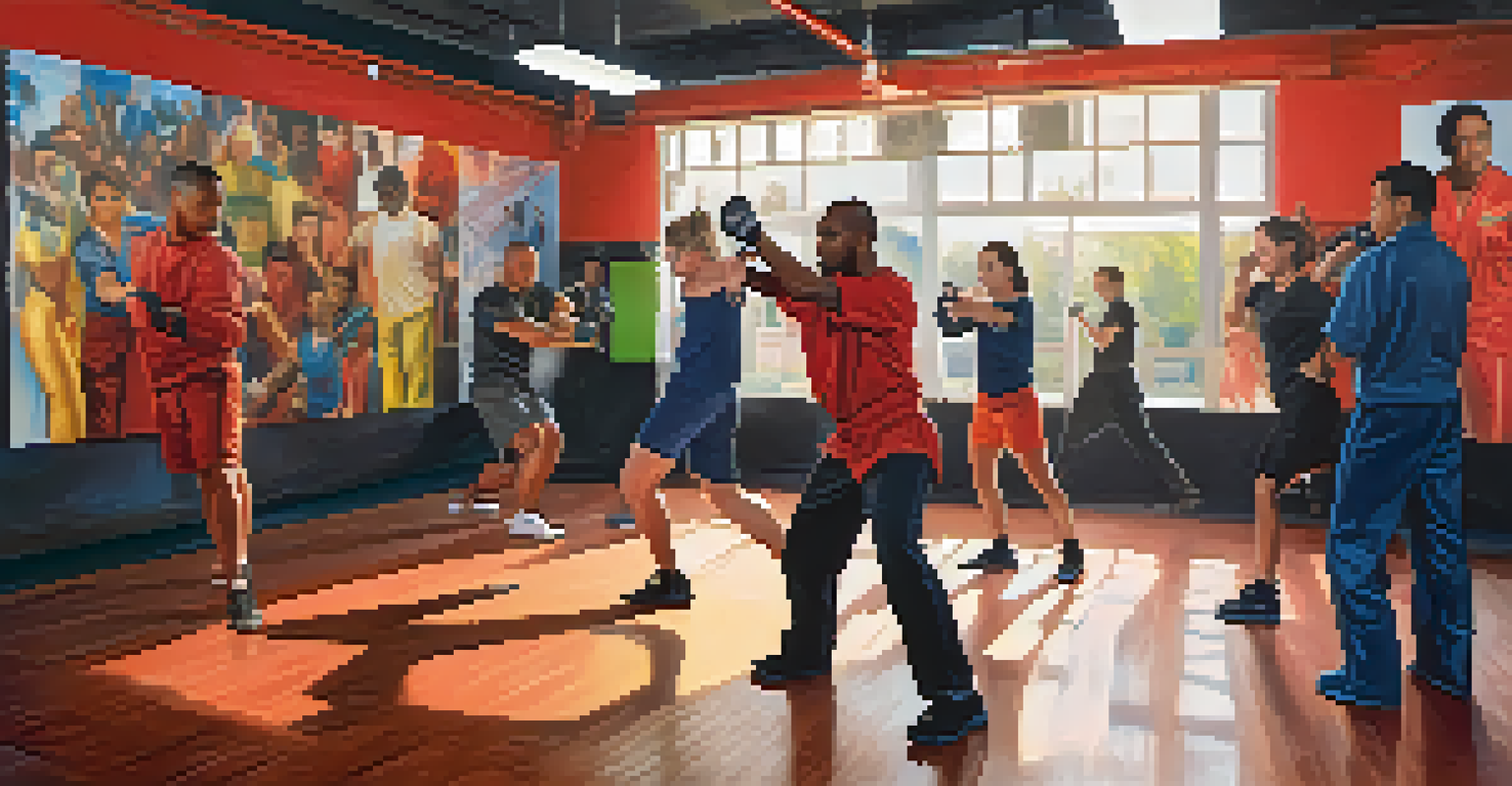Mindfulness Techniques in Self Defense for Autism

Understanding Mindfulness and Its Benefits
Mindfulness is the practice of being fully present in the moment, which can be particularly beneficial for individuals with autism. By focusing on their breath or surroundings, individuals can reduce anxiety and increase self-awareness. This heightened awareness not only helps in daily life but also plays a crucial role in self-defense situations.
Mindfulness is a way of befriending ourselves and our experience.
For many, the world can feel overwhelming, with sensory overload and social interactions posing challenges. Mindfulness techniques can help individuals ground themselves, allowing for clearer thinking in stressful moments. When faced with potential threats, being mindful can enable a person to assess their surroundings and make informed decisions quickly.
Moreover, practicing mindfulness regularly can improve emotional regulation. This is vital during self-defense scenarios, where emotions might run high. By learning to stay calm and collected, individuals can respond rather than react, ensuring their safety and well-being.
Breathing Techniques to Anchor the Mind
One of the simplest yet effective mindfulness techniques is focused breathing. By taking deep, slow breaths, individuals can calm their nervous system and reduce feelings of panic. This technique is not just about relaxation; it is also a powerful tool for maintaining clarity during potentially threatening situations.

Practicing breathing techniques regularly can create a sense of familiarity, making it easier to employ them in high-stress moments. For instance, if someone is approached in an uncomfortable situation, taking a moment to breathe can help them regain composure and assess the situation more effectively. This simple action can be the difference between a level-headed response and an impulsive reaction.
Benefits of Mindfulness for Autism
Mindfulness enhances self-awareness and emotional regulation, helping individuals with autism manage stress and improve their responses in self-defense situations.
Incorporating breathing exercises into daily routines can also enhance overall well-being. Whether it’s through meditation or simply pausing to focus on breaths throughout the day, this practice fosters a sense of calm that can benefit both mental health and personal safety.
Grounding Techniques for Immediate Focus
Grounding techniques are essential for bringing attention back to the present moment, especially during feelings of overwhelm. Simple activities, such as identifying five things you can see, hear, or touch, can help anchor thoughts and redirect focus. This is especially useful in self-defense situations, where clarity is vital.
The mind is everything. What you think you become.
For individuals with autism, grounding techniques can also act as a bridge to improve social interactions. By practicing these techniques, they can learn to manage their emotional responses and engage with others more effectively. This not only aids in self-defense but also fosters better relationships with peers and caregivers.
Incorporating grounding exercises into daily life can create a toolkit for coping with anxiety and stress. These practices can be tailored to individual preferences, making them a personalized solution for enhancing self-awareness and confidence.
Visualization Techniques for Confidence
Visualization is a powerful mindfulness technique where individuals imagine themselves succeeding in various scenarios. For self-defense, visualizing a positive outcome can build confidence and reduce fear. This mental rehearsal prepares individuals for real-life situations, making them feel more in control.
By picturing themselves responding calmly and effectively to a threat, individuals can train their minds to react in a similar way when faced with actual challenges. This practice not only boosts self-esteem but also enhances problem-solving skills during critical moments.
Techniques for Grounding and Focus
Breathing and grounding techniques provide immediate focus and calm, enabling individuals to navigate overwhelming situations more effectively.
Regularly engaging in visualization exercises can foster a sense of empowerment. When individuals with autism visualize themselves overcoming obstacles, they cultivate a resilient mindset that is essential for both self-defense and everyday life.
Physical Awareness and Body Language Mastery
Understanding physical awareness and body language is crucial in self-defense, particularly for those on the autism spectrum. Mindfulness practices can help individuals tune into their own body signals, making them more aware of their movements and posture. This awareness can be vital in recognizing potential threats before they escalate.
By developing a strong sense of body language, individuals can also learn to read the cues of others. This skill can help them gauge the emotional states of those around them, allowing for better responses in social situations and enhancing safety. Recognizing when someone may pose a threat is an invaluable skill in self-defense.
Incorporating body awareness exercises, such as yoga or tai chi, can further enhance this skill. These practices encourage mindfulness while promoting physical strength, balance, and coordination—key components in effective self-defense.
Role-Playing Scenarios for Practical Application
Role-playing different self-defense scenarios is an effective way to apply mindfulness techniques in a safe environment. This practice allows individuals with autism to rehearse responses to various situations, solidifying their skills and building confidence. By acting out scenarios, they can experience the emotions and responses that might arise in real life.
Through role-playing, individuals can also experiment with different mindfulness techniques to see what works best for them. This hands-on approach helps reinforce the idea that they have control over their reactions, which is empowering. It also provides a supportive space for learning and growth.
Personalized Self-Defense Strategies
Creating a tailored mindfulness self-defense plan empowers individuals with autism to build confidence and enhance their safety through regular practice.
Moreover, practicing these scenarios with trusted friends or family members can create a sense of community and safety. This support system can make the learning process enjoyable and less intimidating, encouraging regular practice of self-defense skills.
Creating a Personalized Mindfulness Self-Defense Plan
Developing a personalized mindfulness self-defense plan can empower individuals with autism to take charge of their safety. This plan can include specific mindfulness techniques tailored to their unique needs and preferences. By identifying the strategies that resonate most with them, individuals can create a toolkit that fosters confidence and security.
Additionally, setting realistic goals within this plan can encourage ongoing practice and improvement. Whether it’s committing to daily breathing exercises or scheduling weekly role-playing sessions, these incremental steps can lead to significant growth over time. This structured approach helps cultivate a sense of accomplishment and progress.

It's essential for individuals to revisit and adjust their plans regularly as they learn and grow. By staying flexible and open to new techniques, they can continue to enhance their self-defense skills and mindfulness practices, ultimately leading to a more empowered and confident self.